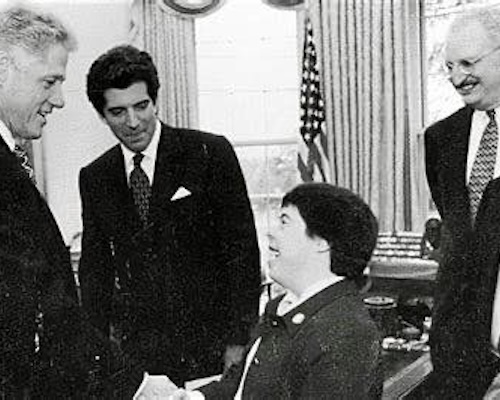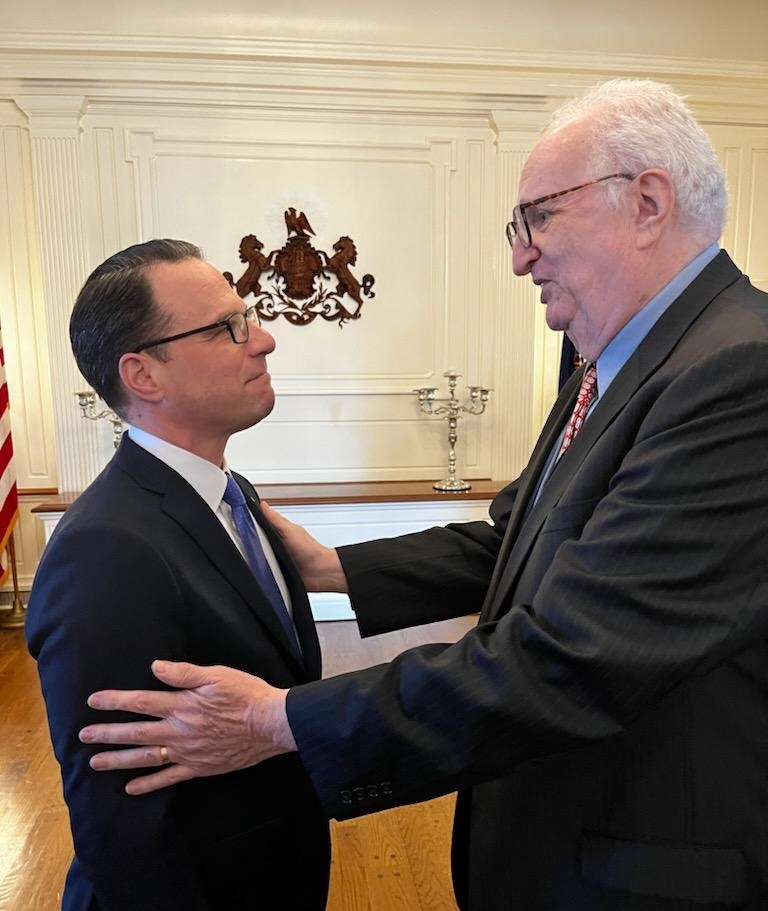The InVisionary
 Gary Blumenthal, InVision’s vice president of government relations and advocacy, has dedicated his career to the service of people experiencing intellectual disabilities and autism (ID/A). But for him, it’s more than an occupation – it’s a personal mission. Gary’s brother Steve was born with autism. Growing up in Kansas in the late 50’s and early 60’s, there were no community-based services for people with autism. The only option at the time was an institution, which was more than 100 miles away.
Gary Blumenthal, InVision’s vice president of government relations and advocacy, has dedicated his career to the service of people experiencing intellectual disabilities and autism (ID/A). But for him, it’s more than an occupation – it’s a personal mission. Gary’s brother Steve was born with autism. Growing up in Kansas in the late 50’s and early 60’s, there were no community-based services for people with autism. The only option at the time was an institution, which was more than 100 miles away.In the late 70s, the community system began to develop, but the people who were served in these organizations were generally the easiest to support. The people with greater needs, like Steve, remained in institutions. When he was able to return to his community, Steve was placed in a large dormitory that housed approximately 40 people. Given Steve’s more complex needs, the organization continued to warn that if he didn’t begin to “behave correctly” they couldn’t continue to serve him. Ultimately in the early 80s, Steve was forced out of the program and back into an institution. That was when Gary decided to make a change.
Gary ran for and was elected to the state legislature. His focus in this role was to bring light to the challenges facing people with intellectual disabilities and mental health diagnoses. And although the system had failed his brother for decades, he became its biggest advocate on how to reform the community system.
 In 1992, Bill Clinton was elected President and Gary was appointed as the executive director of what is now called the President’s Committee on Intellectual Disability. He formed training teams for the National Academy on Intellectual Disabilities – bringing together experts in best practices to urge states to move toward supported independent living and away from congregate programs, improve day-to-day living, and employment services. Among the first states he worked with was Pennsylvania when Nancy Thaler was in her first incarnation as deputy secretary of ODP. John F Kennedy, Jr., was also appointed by President Clinton to serve on the committee. Through John’s foundation, Reaching Up, they awarded grants to help Direct Support Professionals (DSPs) receive college degrees to professionalize the role. John was instrumental in working with the committee to form what is now the National Association of Direct Support Professionals (NADSP).
In 1992, Bill Clinton was elected President and Gary was appointed as the executive director of what is now called the President’s Committee on Intellectual Disability. He formed training teams for the National Academy on Intellectual Disabilities – bringing together experts in best practices to urge states to move toward supported independent living and away from congregate programs, improve day-to-day living, and employment services. Among the first states he worked with was Pennsylvania when Nancy Thaler was in her first incarnation as deputy secretary of ODP. John F Kennedy, Jr., was also appointed by President Clinton to serve on the committee. Through John’s foundation, Reaching Up, they awarded grants to help Direct Support Professionals (DSPs) receive college degrees to professionalize the role. John was instrumental in working with the committee to form what is now the National Association of Direct Support Professionals (NADSP).After five years with the Clinton administration, Gary moved on and assumed roles in Florida, his home state of Kansas, as well as Massachusetts, and California, all with a focus on improving the intellectual disability system.
Then a friend of Gary’s who helped run the gubernatorial campaign of Tom Wolf, and later became his chief of staff, invited Gary and Shirley Walker from the Pennsylvania Advocacy and Resources for Autism and Intellectual Disability (PAR), to meet with Governor Wolf to talk about what was needed in the Commonwealth’s intellectual disability system. They were able to convince the governor to include a significant funding increase in his FY 17/18 budget for ID/A programs that also included a long-sought rate-based program. That’s when he was asked by InVision’s President and Founder, Ruth Siegfried, to advocate on behalf of InVision.
Gary’s been with InVision now for six years, and in that time, he has worked alongside Ruth, InVision Chief Executive Officer (CEO) Kim Love, as well as InVision team members, families, self-advocates and other organizations to urge Pennsylvania leadership to invest in DSPs and people with intellectual disabilities and autism.
When it was apparent that Josh Shapiro was going to be elected to office, Ruth spearheaded a group of intellectual disability CEOs to meet with then attorney general Shapiro to help him understand the challenges our system faces. When Governor Shapiro was elected, they were successful in getting four people from the ID/A community appointed to his transition team, including Ruth.
 After Governor Shapiro was elected, Gary was successful in organizing a meeting with members of the ID/A community and the governor’s office. Lindsey Mauldin, deputy chief of staff for health and human services, who coincidentally is the sibling of two people with intellectual disabilities, was instrumental in helping the governor understand the importance of the issue facing our community and coordinating the meeting. At that meeting were Ruth, other members of the ID/A community, as well as Cindy Jennings, her mother Judy Smith, and her son Matt. Cindy explained to the governor the difficulties she has had in finding support for her son. She explained how, because of the waiver, she could only get a limited number of hours per week. The rest of the time it was up to her, and her 87-year-old mother, to care for Matt’s needs. Gary and Ruth sensed that for Governor Shapiro, it was one of the first times that a family member had access to fully express to him the degree in which families aren’t given the support they need.
After Governor Shapiro was elected, Gary was successful in organizing a meeting with members of the ID/A community and the governor’s office. Lindsey Mauldin, deputy chief of staff for health and human services, who coincidentally is the sibling of two people with intellectual disabilities, was instrumental in helping the governor understand the importance of the issue facing our community and coordinating the meeting. At that meeting were Ruth, other members of the ID/A community, as well as Cindy Jennings, her mother Judy Smith, and her son Matt. Cindy explained to the governor the difficulties she has had in finding support for her son. She explained how, because of the waiver, she could only get a limited number of hours per week. The rest of the time it was up to her, and her 87-year-old mother, to care for Matt’s needs. Gary and Ruth sensed that for Governor Shapiro, it was one of the first times that a family member had access to fully express to him the degree in which families aren’t given the support they need.In the governor’s first budget, advocates were unable to get the needed funding amended into the budget, but the governor promised to make it a priority in next year’s FY 24/25 budget. While it wasn’t the full figure the ID/A community was hoping for, the governor made good on his promise, and the FY 24/25 budget was signed with a $375 million dollar investment in the ID/A community and a commitment to eventually eliminate the emergency waiting list for services.
In writing this article, Gary told me that this wasn’t about him. A humility, I assume, forged through a lifetime of service. To him, the ID/A community is about families. It’s about the people of InVision – the support and guidance he has received from Ruth, Kim and the entire leadership team. He said, “This is who we are as a community and as an organization, and I am fortunate that I have been able to work with people who allow me to pursue our goals and needs with passion. Ruth is atypical of most leaders in this movement. She’s not afraid of pushing the envelope, of meeting individuals’ needs, or speaking uncomfortable truths to power. Ruth and Kim are not afraid of saying to the state, ‘you need to help us.’” He continued, “I’m just pretty darned lucky. Lucky to be a part of this team.”
I asked Gary how he finds the motivation to keep going, especially given that what he does comes with so much disappointment. He said, “The same place DSPs find the will to go to work every day. The same drive moms and dads with children with disabilities feel to support their children even into late adulthood. I am first and foremost a family member. I am first and foremost Steve Blumenthal’s brother.”
Through the love and support of his family, as well as changes to the ID/A system that Gary has advocated for during his career, Steve has been successfully living in a community-based program since 1995.

Comments (0)